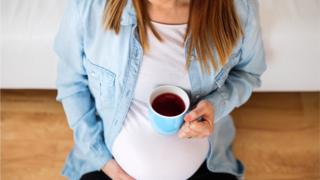Home births: Community midwives trial ‘delivery bags’
 Image copyright Getty Images
Image copyright Getty Images Midwives are trialling “delivery bags” to promote safe births at home.
Hywel Dda health board is the only one in Wales selected for the Baby Lifeline trial due to its home birth rate and the large area it covers.
In 2017, 3.9% of births in the board area were at home, compared to the Wales average of 2.4% (770 of 32,236 births). Powys’ rate was 8%.
The rucksacks contain scissors to cut the cord, a hat and towels for the newborn and equipment for emergencies.
Catrin Davies from Aberystwyth, Ceredigion, said she discussed having a home birth but was “scared”.
She had her son Sam at Bronglais Hospital in January 2018 by an emergency caesarean section after being induced at 42 weeks.
“I didn’t really consider a home birth, but I did discuss the option briefly in the first trimester.
“I was relaxed about most things, but I did consider what happens if the weather was bad and we wouldn’t be able to make it in [to hospital] especially when I was overdue and came into the Christmas period, knowing resources would be limited.”
The 31-year-old said many mothers-to-be were worried they would not receive as much support at home.
“The idea of a home birth scared me and still does,” she said.
“If something went wrong you’re adding time to what could be done, or a problem not being detected as quickly.
“One example is I attempted to breastfeed and I got support from the midwives in hospital based on my needs, not a timed slot with community midwives.
“I think, though, that many people could have a positive home birth if it was once again the norm.”
Caerphilly-based doula Samantha Gadsden, who runs Home Birth Support Group UK and the South Wales Home Birth and Hopefuls Group, said birth was “more pleasant at home”.
“Anything that interrupts the hormonal flow of birth can lead to changes in the birth.
“When you go from your own home where you’re comfortable and safe to a hospital environment where you’re bombarded with questions and it’s bright and white, it’s not a conducive environment for birth.”
Ms Gadsden, who had two home births, said transfers to hospital were usually needed for more pain relief or labour was not progressing within specified timelines and “life or death emergencies” were rare.
“You have to spend the early part of your birth at home anyway and if you need intervention at home, the chances are you would have needed it at hospital.”
Lynn Hurley, lead midwife for Hywel Dda, said the bags – which will be used from April – would promote a “safe and high quality service”, and the aim was to eventually roll out the initiative across Wales.
Judy Ledger, founder and chief executive of mother and baby charity Baby Lifeline, said: “Frontline community midwives reiterated the same thing that nationally, there is no standardisation in what equipment is carried to community births.
“What’s very important is that we’ve also developed the right processes to make sure the contents are replenished and kept up to date.”
In England, 2.1% of women gave birth at home in 2017 compared with 2.4% in Wales – of 679,106 live births across both countries.
The England figure for 2016 was the same, while Wales’ had dropped slightly from 2.7%.
Powys health board, which has the highest home birth rate in Wales, said women tend to see the same midwife throughout pregnancy helping to establish a good relationship to discuss birth options, and women can have antenatal appointments at home.

